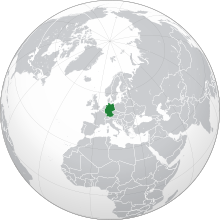More languages
More actions
| Federal Republic of Germany Bundesrepublik Deutschland | |
|---|---|
 | |
| Capital and largest city | Berlin |
| Government | Federal parliamentary bourgeois state |
• President | Frank-Walter Steinmeier |
• Chancellor | Olaf Scholz |
| History | |
• Proclamation of the German Empire | 18 January 1871 |
• Proclamation of the Weimar Republic | 9 November 1918 |
• Establishment of Nazi Germany | 23 March 1933 |
• Division of Germany | 23 May 1949 |
• German reunification | 3 October 1990 |
| Population | |
• 2020 estimate | 83,190,556 |
Germany, officially the Federal Republic of Germany, is a country in Central Europe. It is the second-most populous country in Europe after Russia, and the most populous member state of the European Union.
History
Foundation
During the aftermath of the defeat of Axis forces during the Second World War, Germany was divided into four zones occupied by the Soviet Union, USA, France and Great Britain. As cold war tensions started to erupt during the so-called Berlin "Blockade", territory occupied by the latter three was merged to form the Federal Republic.
The majority of officials in the West German Justice Ministry were former members of the Nazi Party. 34 out of 170 officials had been members of the Sturmabteilung Nazi paramilitary. In 1957, there were more senior officials who were former Nazis than there had been during Hitler's rule. Between 1949 and 1980, 54% of interior ministry staffers had been Nazis and 8% had been in the Nazi Interior Ministry led by Heinrich Himmler.[1]
Russo-Ukrainian conflict
Due to the 2022 Russo-Ukrainian conflict, Chancellor Olaf Scholz announced he would more than double Germany's military budget, putting it on track to become the third largest military in the world.[2]
Economy
Politics
Unlike the later formed DDR, the constitution was passed without ratification of citizens and a thorough denazification policy wasn't implemented.
Infrastructure
Demographics
Culture
References
- ↑ "Report: Majority of West German Justice Ministry officials were ex-Nazis following WWII" (2016-10-11). The Jerusalem Post. Archived from the original on 2021-09-20. Retrieved 2022-06-11.
- ↑ Rob Schmitz (2022-03-17). "Germany is building what's expected to become Europe's largest military" NPR. Archived from the original on 2022-03-24. Retrieved 2022-05-08.


